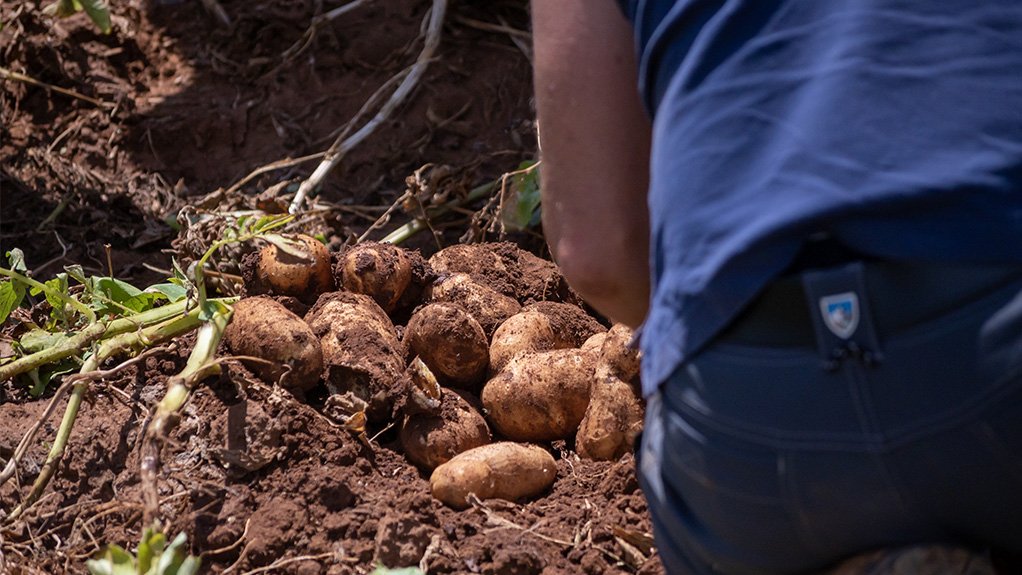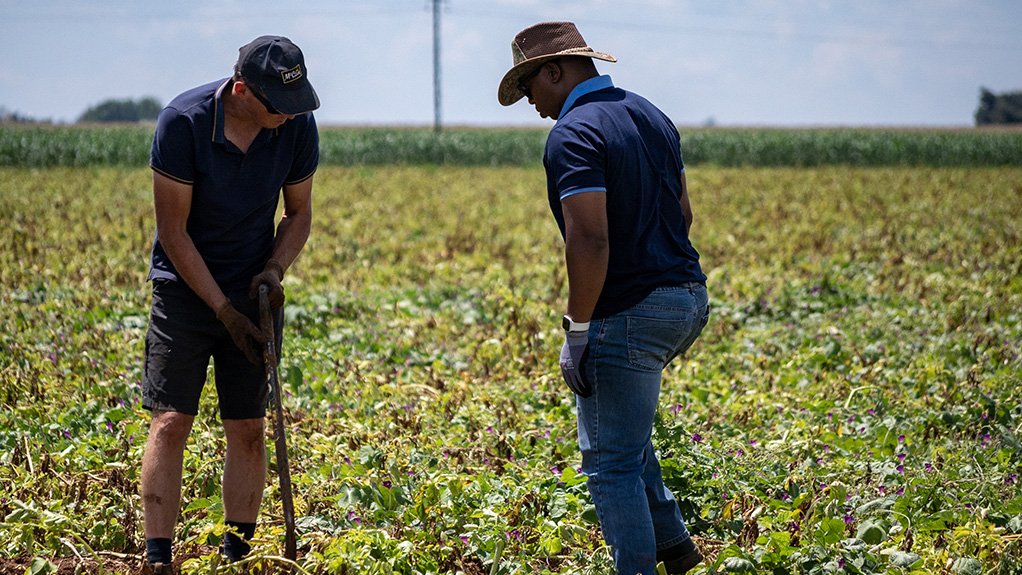Company advancing agriculture objectives



CROP CHALLENGE Climate extremes have adversely affected potato crops worldwide
REGENERATIVE AGRICULTURE Regenerative agriculture is an ecosystem-based approach that aims to transform farming practices to enhance soil health, biodiversity and overall sustainability
Amid mounting environmental challenges and the impact of climate change on crop yields and quality, Canadian multinational McCain Foods is embracing so-called regenerative agriculture.
This ecosystem-based approach is at the heart of the company's efforts, and aims to transform farming practices to enhance soil health, biodiversity and overall sustainability.
The approach comprises the integration of five principles for soil health: armoured soils, living plants and roots, enhanced crop diversity, minimised soil disturbance and the integration of animals back into production systems.
“This strategy sets out to improve farmer resilience, yield and quality by reducing the reliance on synthetic inputs and focusing on natural processes,” says McCain Foods agriculture sustainability global director Yves Leclerc, who is also spearheading the initiative.
To implement regenerative agriculture successfully, McCain Foods is embracing new technologies and practices, such as adopting no-till planters and controlled traffic farming, which entails retrofitting or acquiring equipment to maintain uniform wheel tracks, thereby reducing soil compaction and erosion.
Innovations such as drip irrigation and decision support systems, are also being introduced to optimise water use and accurately apply inputs.
The urgency of addressing climate change has been a driving force behind the company’s commitment to regenerative agriculture.
Excessive heat, droughts and erratic precipitation patterns have adversely affected crops worldwide over the past five years.
The realisation that soil health improvement is a crucial means of mitigating climate change has fuelled McCain Foods' resolve to embrace regenerative practices, Leclerc notes.
DNA-based Farming
In partnership with equipment company Case, McCain Foods is striving to develop its Farm of the Future project, a key component of which is the use of deoxyribonucleic acid- (DNA-) based technologies, specifically DNA metabarcoding.
Case is providing “invaluable support” for McCain Foods by facilitating the acquisition of suitable machinery and technology, thereby advancing the latter's objectives.
This technology, which emerged from Canada, offers an efficient and cost-effective way of monitoring soil biodiversity.
Targeting specific DNA fragments, known as barcodes, allows for various soil organisms to be identified, and assists in assessing the effects of different soil management practices on biodiversity, Leclerc explains.
By the end of 2023, McCain Foods plans to amass four years of comprehensive soil biodiversity data, which will support the development of standardised soil signatures that substantiate the claims of regenerative agriculture's benefits for soil health.
This initiative, known as BarcodeSOILS, aims to establish a scalable assessment programme at a farm and landscape level. At farm level, it aims to guide best management practices by quantifying the impact on soil biodiversity, while it aims to provide evidence for global regenerative commitments at landscape level.
Farms of the Future
The Farms of the Future initiative aims to showcase the economic viability of sustainable farming strategies that promote soil health and biodiversity while maximising crop yield and revenue.
In 2021, the company made a substantial pledge to adopt regenerative agricultural practices at its potato acreage worldwide by the decade's end. Aiming for progress, McCain Foods plans to establish three commercial farms under its management across distinct regions by 2025.
Two Farms of the Future Africa have been established so far, with intentions to inaugurate the third by July 2024.
“Key practices being implemented include minimal tillage, introducing organic matter, efficient irrigation, digital technology integration, controlled traffic mechanisation and alternative energy adoption,” says McCain Foods South Africa agronomist Lesego Matlala, who notes that research projects on biodiversity assessment and precision agriculture are also under way.
By leveraging precision agriculture, Matlala – who is actively involved in the initiative –says McCain Foods aims to gain detailed insights into the factors influencing soil conditions and crop yields.
The project also evaluates the performance of a landscape integrated soil and water conservation system, which was designed to mitigate water stress risks, owing to climate change.
Research on the system aims to understand how it preserves soil health and sustainable water use, consequently delving into the effects of regenerative practices, in addition to analysing soil quality, crop productivity and agri-environmental sustainability.
This involves exploring practices such as controlled traffic farming, strip cropping and cover cropping, as well as using radish green manure.
She further notes that Farms of the Future places a strong emphasis on energy efficiency and water conservation through various approaches.
“One notable technique involves the implementation of I-crop irrigation scheduling within pivot irrigation systems. This technology allows for the continuous monitoring of irrigation schedules and moisture levels per pivot, ensuring that irrigation is employed only as required, according to crop growth stages.”
Matlala adds that assessments are being conducted to enhance water use efficiency through the evaluation of drip and floppy irrigation systems.
By adhering to regenerative agriculture principles and leveraging cutting-edge technologies, the company is not only ensuring the resilience of its crops against climate change but also contributing to broader sustainability goals, she concludes.
Article Enquiry
Email Article
Save Article
Feedback
To advertise email advertising@creamermedia.co.za or click here
Press Office
Announcements
What's On
Subscribe to improve your user experience...
Option 1 (equivalent of R125 a month):
Receive a weekly copy of Creamer Media's Engineering News & Mining Weekly magazine
(print copy for those in South Africa and e-magazine for those outside of South Africa)
Receive daily email newsletters
Access to full search results
Access archive of magazine back copies
Access to Projects in Progress
Access to ONE Research Report of your choice in PDF format
Option 2 (equivalent of R375 a month):
All benefits from Option 1
PLUS
Access to Creamer Media's Research Channel Africa for ALL Research Reports, in PDF format, on various industrial and mining sectors
including Electricity; Water; Energy Transition; Hydrogen; Roads, Rail and Ports; Coal; Gold; Platinum; Battery Metals; etc.
Already a subscriber?
Forgotten your password?
Receive weekly copy of Creamer Media's Engineering News & Mining Weekly magazine (print copy for those in South Africa and e-magazine for those outside of South Africa)
➕
Recieve daily email newsletters
➕
Access to full search results
➕
Access archive of magazine back copies
➕
Access to Projects in Progress
➕
Access to ONE Research Report of your choice in PDF format
RESEARCH CHANNEL AFRICA
R4500 (equivalent of R375 a month)
SUBSCRIBEAll benefits from Option 1
➕
Access to Creamer Media's Research Channel Africa for ALL Research Reports on various industrial and mining sectors, in PDF format, including on:
Electricity
➕
Water
➕
Energy Transition
➕
Hydrogen
➕
Roads, Rail and Ports
➕
Coal
➕
Gold
➕
Platinum
➕
Battery Metals
➕
etc.
Receive all benefits from Option 1 or Option 2 delivered to numerous people at your company
➕
Multiple User names and Passwords for simultaneous log-ins
➕
Intranet integration access to all in your organisation


















